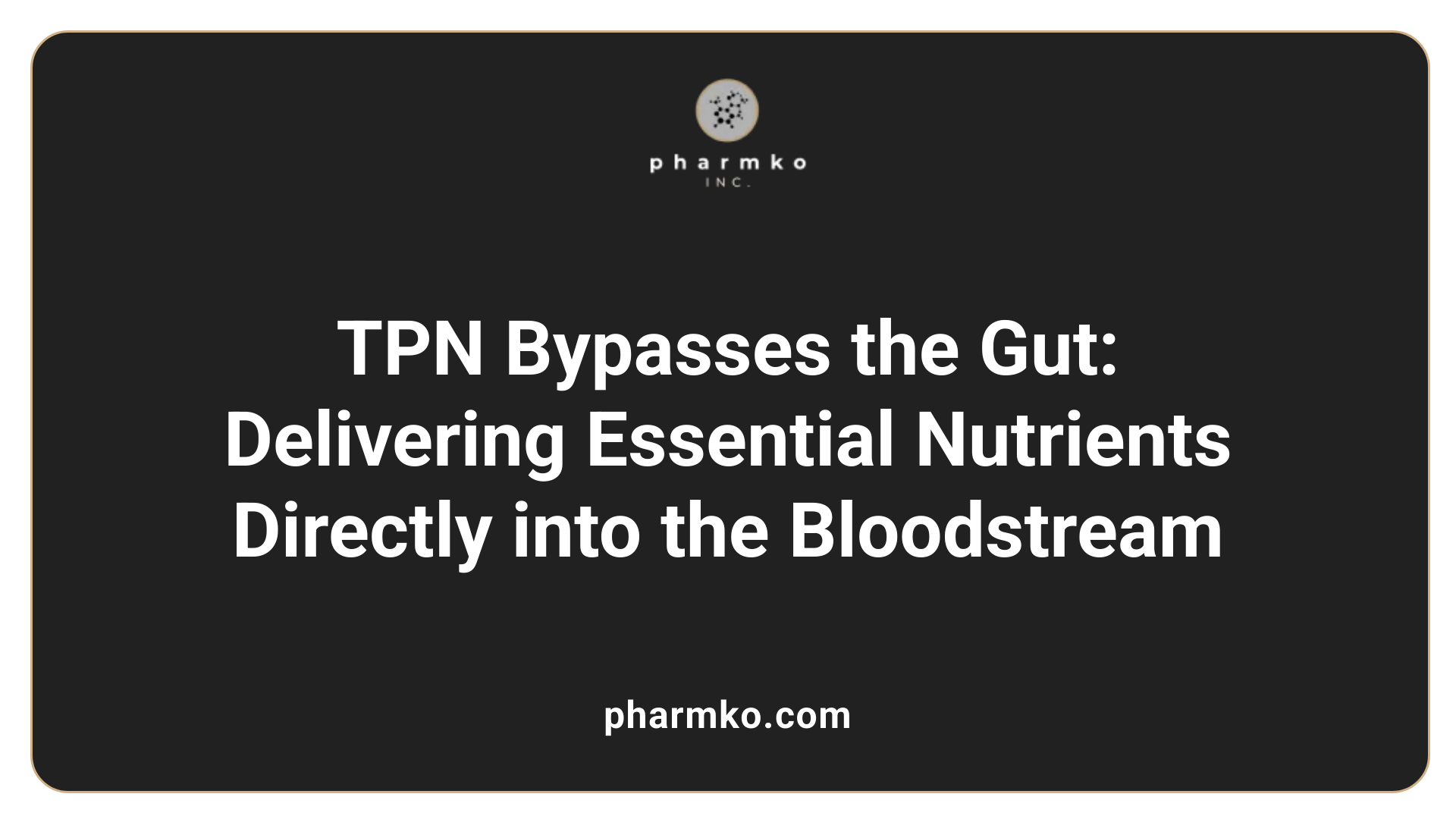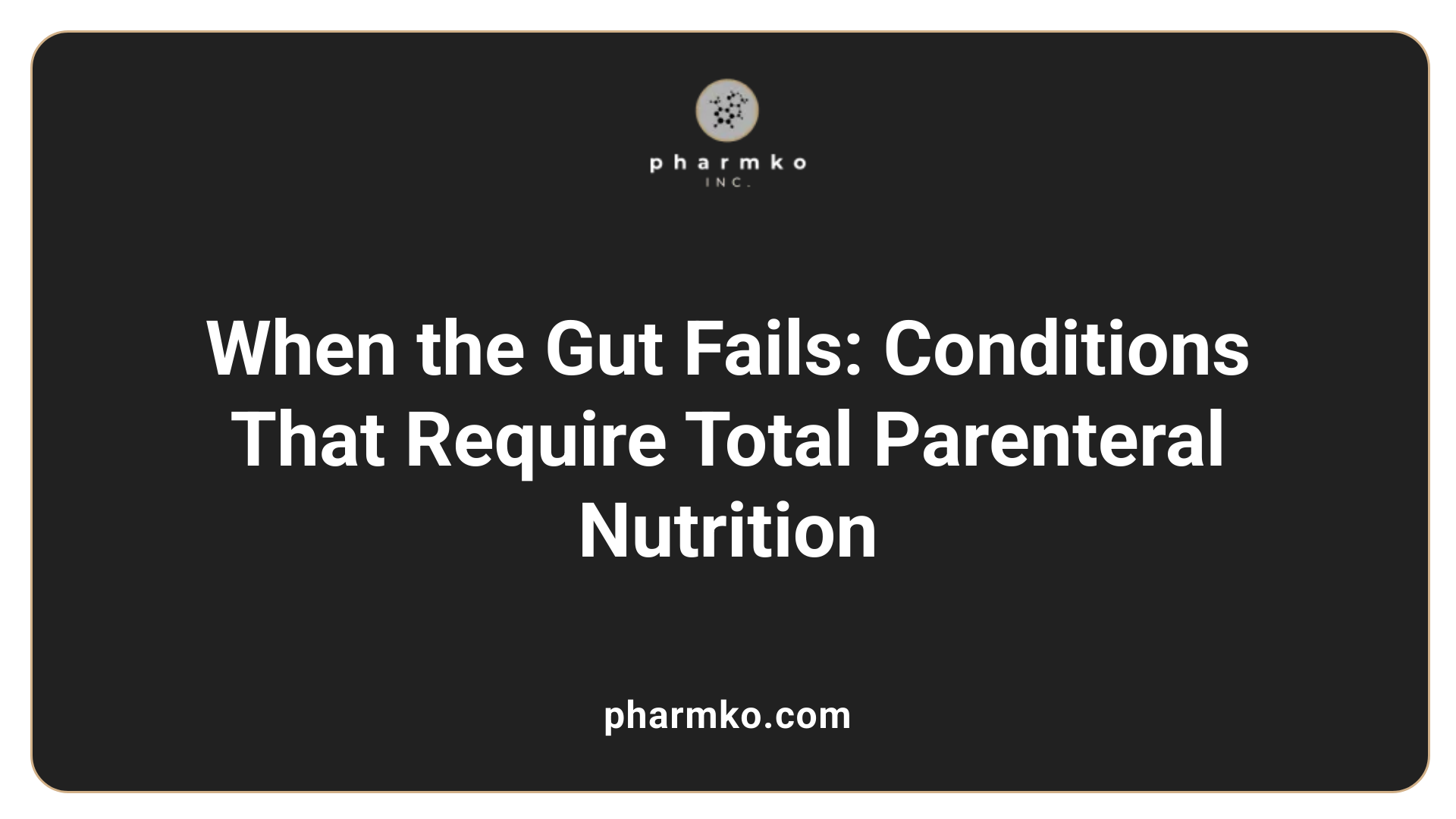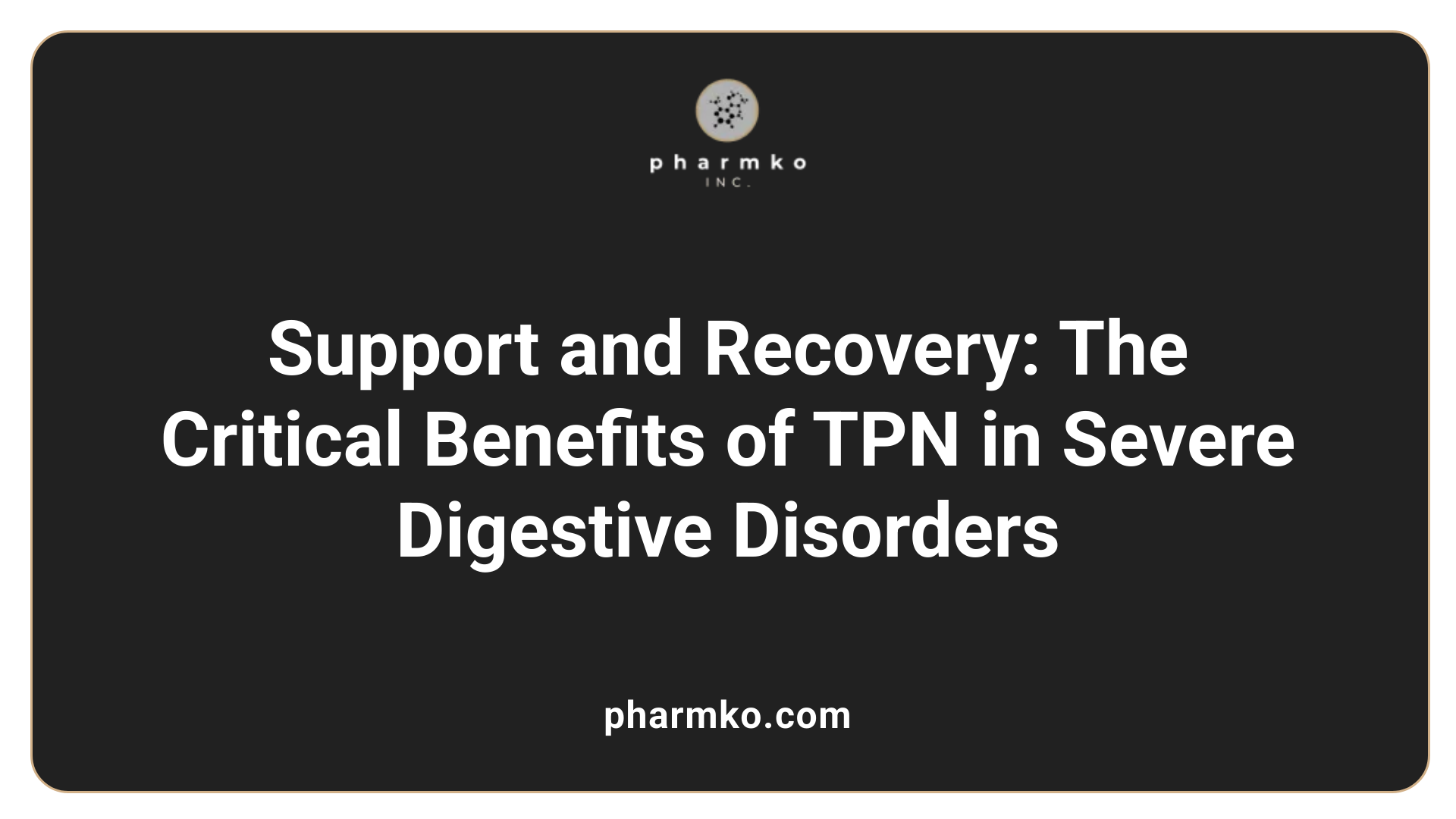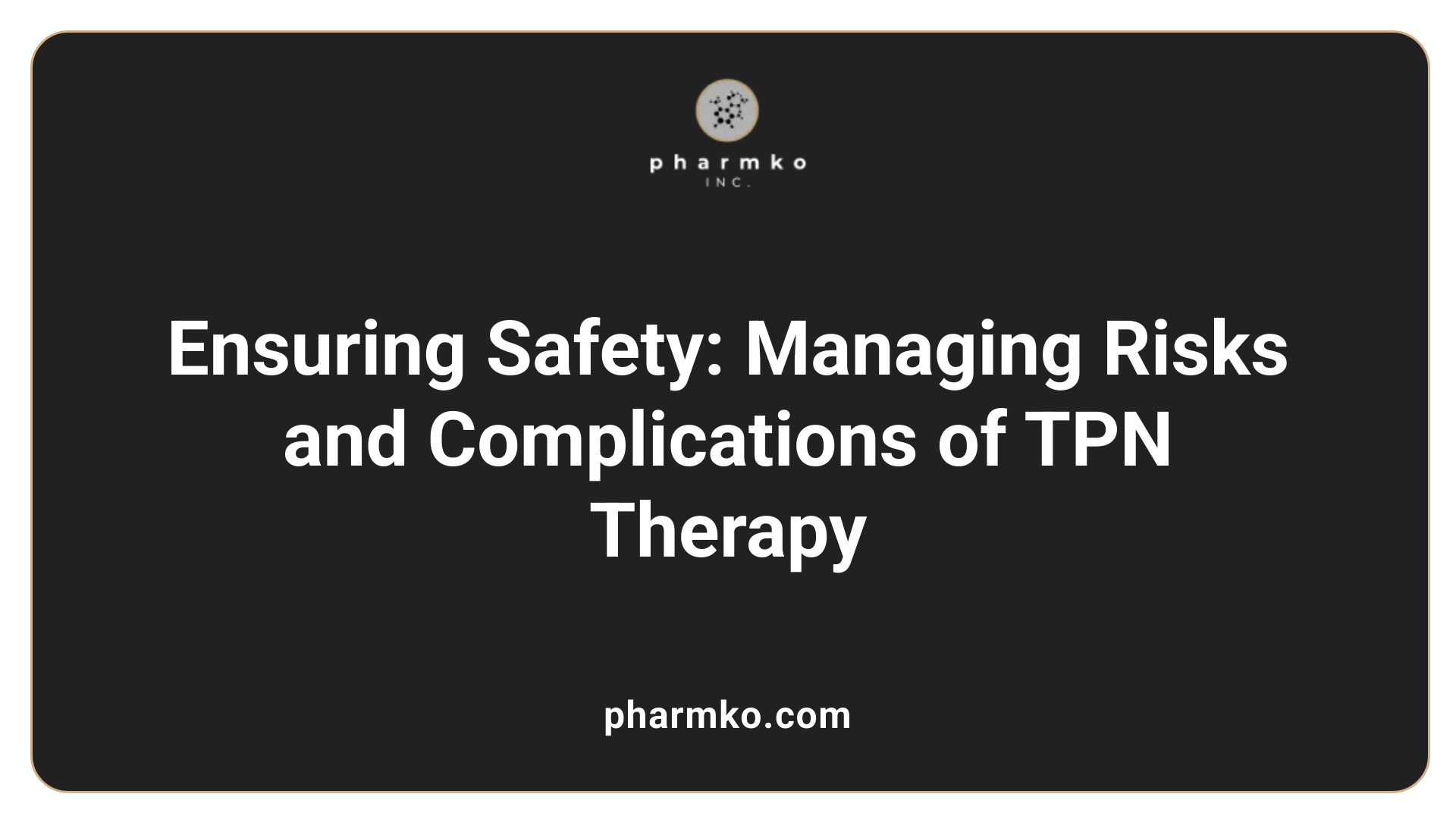TPN for severe digestive disorders
Understanding TPN: A Crucial Intervention for Severe Digestive Disorders
Total parenteral nutrition (TPN) represents a vital medical intervention for patients suffering from severe digestive disorders that impair the gastrointestinal tract’s ability to process or absorb nutrients. When traditional feeding methods are insufficient or contraindicated, TPN provides a direct route for essential nutrients to enter the bloodstream, bypassing the digestive system. This article explores the mechanisms, indications, benefits, risks, administration procedures, and clinical considerations associated with TPN, emphasizing its indispensable role in managing complex gastrointestinal conditions.
What is TPN and How It Works in Severe Digestive Disorders

What is TPN and how does it work in the context of severe digestive disorders?
Total parenteral nutrition (TPN) is a method of feeding that delivers all essential nutrients—carbohydrates, proteins, fats, vitamins, and minerals—directly into a person’s bloodstream through a vein. This technique bypasses the gastrointestinal (GI) tract completely, making it vital for patients whose digestive systems cannot process or absorb food properly.
In cases of severe gastrointestinal disorders such as bowel obstruction, Crohn’s disease, short bowel syndrome, or after major surgeries, the gut may be unable to function effectively. TPN provides these patients with a necessary nutritional supply, giving their gastrointestinal system a chance to rest and heal.
The process involves inserting a catheter—often a PICC line, tunneled catheter, or implantable port—into a large vein, usually in the chest or arm. Through this catheter, a specially prepared solution containing nutrients is infused continuously or intermittently. TPN is flexible, allowing care providers to tailor the nutrient composition to specific patient needs, whether temporary or long-term.
Managing TPN requires diligent monitoring by a multidisciplinary healthcare team. Regular checks on blood electrolytes, kidney and liver functions, and metabolic parameters help prevent complications. Additionally, strict aseptic techniques are essential to reduce infection risks, such as bloodstream infections, which are a significant concern during TPN therapy.
Overall, TPN plays a crucial role in supporting patients with severe digestive failures, helping maintain growth, healing, and overall health until they can resume normal oral or enteral feeding.
Medical Conditions Requiring TPN in Severe Digestive Health Issues

What medical conditions indicate the use of TPN in severe digestive health issues?
Total Parenteral Nutrition (TPN) is primarily used when the gastrointestinal (GI) system cannot properly process or absorb nutrients, which can happen due to a variety of severe health conditions. These include bowel obstructions, fistulas, severe forms of Crohn's disease, gastrointestinal cancers, and intestinal failure.
Bowel obstructions prevent normal food passage through the intestines, making it impossible for nutrients to be absorbed. Similarly, high-output fistulas and leaks after surgery can compromise nutrient absorption and require TPN for nutritional support.
Patients with inflammatory bowel diseases such as Crohn's disease and ulcerative colitis often experience severe complications that impair the digestive tract, necessitating bypass or bowel rest with TPN. In cases of gastrointestinal cancers, the tumor can block or damage digestive pathways, creating the need for intravenous nutrition.
Short bowel syndrome, which involves significant removal of intestinal segments, limits the body's ability to absorb nutrients and fluids, making TPN essential for survival and growth.
Other critical digestive conditions include post-operative bowel rest after major surgeries, severe diarrhea or vomiting leading to dehydration and malnutrition, and gastrointestinal failure due to conditions like radiation enteritis or necrotizing enterocolitis.
The goal of TPN in these scenarios is to deliver complete or supplemental nutrients directly into the bloodstream, ensuring the patient maintains nutritional health while bypassing dysfunctional parts of the GI tract.
In summary, TPN serves as a vital intervention for a range of severe digestive disorders, especially when conventional enteral feeding isn't feasible or sufficient. It helps prevent malnutrition, supports recovery, and enhances clinical outcomes in these complex conditions.
Benefits of TPN in Severe Digestive Disorders

What are the benefits of TPN in managing severe digestive disorders?
Total parenteral nutrition (TPN) provides vital support for patients suffering from severe digestive disorders when traditional eating or enteral feeding isn’t possible. By delivering nutrients directly into the bloodstream, TPN ensures that the body receives essential calories, proteins, fats, vitamins, and minerals, which are crucial for maintaining health and promoting recovery.
This method is particularly beneficial for conditions such as bowel obstruction, fistulas with high output, severe diarrhea, malabsorption syndromes, and extensive intestinal resections. It effectively prevents or corrects malnutrition, which can significantly improve patient outcomes.
TPN also plays a vital role in supporting wound healing and tissue recovery. By providing targeted nutrients, it helps the body repair damaged tissues, control inflammation, and promote overall healing.
Another critical advantage is that TPN allows the intestines to rest, which can be essential during acute phases of illness or after surgical interventions like bowel resection. Resting the bowel can reduce inflammation and improve healing.
In addition, TPN improves clinical outcomes by reducing the risk of dehydration, electrolyte imbalances, and nutritional deficiencies. It offers a customizable approach, tailoring nutrient formulas to meet individual needs based on lab results and clinical status.
For patients with critical illnesses, such as those undergoing cancer chemotherapy or suffering from severe pancreatitis, TPN ensures continuous nutritional support, boosting recovery chances and enhancing quality of life. For long-term cases like intestinal failure or short bowel syndrome, TPN can sustain life and provide nutritional stability.
Overall, TPN is a lifesaving and supportive therapy that helps manage complex gastrointestinal conditions, promotes healing, prevents malnutrition, and ultimately leads to better health outcomes.
Risks, Side Effects, and Management of Complications with TPN

What are the risks and potential complications of TPN therapy?
Total parenteral nutrition (TPN) offers vital support for patients with impaired gastrointestinal function but carries several risks. These include infections, especially bloodstream infections like catheter-related sepsis, and mechanical issues associated with venous access such as pneumothorax, bleeding, and blood clots. Liver complications are also common in long-term TPN use, including fatty liver, cholestasis, and even cirrhosis. Moreover, TPN can cause metabolic disturbances like hyperglycemia, electrolyte imbalances, and nutrient deficiencies.
What are the side effects of TPN in adults?
The side effects of TPN are diverse. Infections remain a significant concern, arising from contaminated catheter sites or bacteria entering the bloodstream. Metabolic issues such as hyperglycemia and hypoglycemia can occur, particularly if glucose infusion rates are not well-controlled. Electrolyte disturbances—including hyponatremia, hypokalemia, and hypophosphatemia—are frequent and necessitate regular monitoring.
Long-term TPN use has been linked to liver problems, including parenteral nutrition-associated liver disease, with manifestations like fatty infiltration of the liver and cholestasis. Gallstone formation and biliary sludge are also notable risks. Mechanical problems during catheter placement can cause vascular injury, bleeding, or venous thrombosis, complicating treatment.
Additionally, nutritional imbalances may lead to problems like bone demineralization or refeeding syndrome, especially in severely malnourished patients. Lipid emulsions may trigger allergic reactions or intolerance in some individuals.
Monitoring and prevention strategies
To mitigate these risks, comprehensive monitoring is essential. This includes regular assessment of serum electrolytes, liver function tests, blood glucose levels, and observation for signs of infection. Strict aseptic techniques during catheter insertion and maintenance help prevent infections. Selection of appropriate catheter sites and proper handling are critical for reducing mechanical complications.
Monitoring the patient’s nutritional status, adjusting infusion rates, and tailoring the composition of TPN solutions based on laboratory results are vital. Use of antimicrobial-impregnated catheters and routine site care further decreases infection risks.
Prevention of liver and gallbladder issues involves stimulating gallbladder motility, often by stimulating cholecystokinin secretion, and avoiding medications that diminish biliary flow. Gradual initiation of TPN and regular assessment of liver health are also crucial for early detection and management of complications.
A multidisciplinary team approach, including physicians, nurses, pharmacists, and dietitians, enhances the safe use of TPN and minimizes adverse outcomes. Proper patient education and vigilant clinical follow-up form the backbone of effective complication management in TPN therapy.
Administration Procedures and Patient Considerations in TPN Therapy
How is TPN administered, and what patient considerations are involved?
Total parenteral nutrition (TPN) is delivered through a specialized central venous catheter. Common access options include peripherally inserted central catheters (PICC lines), tunneled catheters, or implantable ports. These devices allow nutrient-rich solutions to flow directly into large central veins, bypassing the digestive system.
The infusion typically occurs over 10 to 12 hours each day, often using a programmable pump to ensure steady delivery. Since TPN solutions are highly concentrated, they are not suitable for peripheral IVs, which are used for short-term or low-osmolarity parenteral nutrition.
Patient considerations are critical to ensure safety and effectiveness. Healthcare providers monitor blood glucose levels, electrolytes, liver function, and renal parameters regularly to identify metabolic disturbances early. Proper catheter care is essential to minimize infection risks, including strict aseptic techniques, regular dressing changes, and monitoring for signs of infection or thrombosis.
In addition, staff and patient education play a vital role. Patients and caregivers need to know how to handle the infusion system, recognize symptoms of complications such as fever, redness at the catheter site, or signs of infection, and understand the importance of hygiene practices.
Formulation adjustments are made based on laboratory results, with nutrient compositions tailored to individual needs. This personalized approach involves a multidisciplinary team, including physicians, dietitians, and nurses, carefully overseeing ongoing management.
In summary, TPN administration involves complex procedures and requires meticulous patient management to optimize outcomes and prevent complications.
Ensuring Optimal Outcomes with Careful TPN Management
The use of TPN in severe digestive disorders is a complex but life-saving intervention. Its success depends on meticulous formulation, vigilant monitoring, and comprehensive care by a multidisciplinary team. While the risks associated with TPN, including infections and metabolic complications, are significant, advances in clinical guidelines, infection control practices, and patient education have markedly improved safety and outcomes. TPN not only sustains nutrition when the gastrointestinal tract cannot, but also promotes healing and recovery, ultimately enhancing the quality of life for patients with otherwise intractable digestive conditions. Proper implementation, regular evaluation, and proactive management are essential to maximize the benefits and minimize potential adverse effects.
References
- Total Parenteral Nutrition - StatPearls - NCBI Bookshelf
- Total Parenteral Nutrition (TPN) - Advocate Health Care
- Parenteral Nutrition: What it Is, Uses & Types - Cleveland Clinic
- Conditions Treated - Total Parenteral Nutrition | Stanford Health Care
- Overview of Total Parenteral Nutrition in Patients With Inflammatory ...
- Conditions Requiring Total Parenteral Nutrition
- Feeding Tubes. Total Parenteral Nutrition (TPN) | Froedtert & MCW
- Total Parenteral Nutrition (TPN)
- Does TPN Cause Diarrhea? | AmeriPharma™ Specialty Pharmacy
- Total parenteral nutrition-related gastroenterological complications













